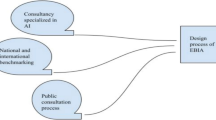Abstract
Countries are adopting artificial intelligence (AI) at a fast rate. This paper analyses the digital transformation lessons from a validation process for a design that proposes modifying an existing internal decision support system that currently aids counsellors internally at the Estonian Unemployment Insurance Fund into a public facing e-service through implementation with another AI enabled government application. The methodology is qualitative with document review, analysis of secondary data, and interviews with experts and stakeholders. The end results indicate that it would be possible to modify an existing system and integrate it to an already existing system in Estonia but that this may not have public value to the citizens. Authors provide an architectural recommendation and discuss the validation results which yield insight into the considerations of the Estonian Government’s tactics and strategy for AI related digital transformation. Future research could include investigation of the digital transformation process of AI projects in Estonia.
Access this chapter
Tax calculation will be finalised at checkout
Purchases are for personal use only
Similar content being viewed by others
References
Di Stefano, G., Gambardella, A., Verona, G.: Technology push and demand pull perspectives in innovation studies: current findings and future research directions. Res. Policy 41(8), 1283–1295 (2020)
Luciano, E.M., Wiedenhöft, G.C.: The role of organizational citizenship behavior and strategic alignment in increasing the generation of public value through digital transformation. In: Proceedings of the 13th International Conference on Theory and Practice of Electronic Governance (2020)
Virkar, S., Alexopoulos, C., Tsekeridou, S., Novak, A.S.: A user-centred analysis of decision support requirements in legal informatics. Gov. Inf. Quart. 39(3), 101713 (2022)
Distel, B.: Bringing light into the shadows: a qualitative interview study on citizens’ non-adoption of e-government. Electron. J. e-Gov. 16(2), pp98–105. (2018)
Jöhnk, J., Weißert, M., Wyrtki, K.: Ready or not, AI comes—an interview study of organizational AI readiness factors. Bus. Inf. Syst. Eng. 63, 5–20 (2021)
Sadiq, R.B., Safie, N., Abd Rahman, A.H., Goudarzi, S.: Artificial intelligence maturity model: a systematic literature review. PeerJ Comput. Sci. 7, e661 (2021)
Van Noordt, C., Misuraca, G.: Exploratory insights on artificial intelligence for government in Europe. Soc. Sci. Comput. Rev. 40(2), 426–444 (2022)
Censorii, E.: The Job Market after Covid-19: OECD Employment Outlook 2021. Digital Skills and Jobs Platform, OECD (2021). https://digital-skills-jobs.europa.eu/en/inspiration/research/job-market-after-covid-19-oecd-employment-outlook-2021. Accessed 26 Aug 2021
Ministry of Economic Affairs and Communication (MKM). Decision support of the unemployment fund OTT (2020). https://www.kratid.ee/kasutuslood
Lopes Gonçalves, D.: Digital Public Services based on open source: Case study on Bürokratt. Joinup European Commission (2022). https://joinup.ec.europa.eu/collection/open-source-observatory-osor/document/digital-public-services-based-open-source-case-study-burokratt
Breaugh, J., Rackwitz, M., Hammerschmid, G.: Leadership and institutional design in collaborative government digitalisation: evidence from Belgium, Denmark, Estonia, Germany, and the UK. Gov. Inf. Q. 40(2), 101788 (2023)
Hernandez, L.: Dataset with cases of Artificial Intelligence usage in the public sector available as Open data. Joinup European Commission (2021). https://joinup.ec.europa.eu/collection/elise-european-location-interoperability-solutions-e-government/news/143-ai-cases-public-sector-are-available-open-data
Shin, D.: The effects of explainability and causability on perception, trust, and acceptance: Implications for explainable AI. Int. J. Hum Comput Stud. 146, 102551 (2021)
Leets, P.: Augmenting Public Sector Data-Driven Decision Support Systems With Expert Knowledge: Case Of Ott. University of Tartu, Tartu, Estonia (2022)
Pignatelli, F.: AI watch: European landscape on the use of artificial intelligence by the public sector annex II. In: JRC Science for Policy Report. European Commission. (2022)
Desiere, S., Struyven, L.: Using artificial intelligence to classify jobseekers: the accuracy-equity trade-off. J. Soc. Policy 50(2), 367–385 (2021)
Yin, R.K.: Case Study Research Design and Methods, 5th edn. Sage, Thousand Oaks, CA (2014)
Vaher, K.: Next generation digital government architecture. Republic of Estonia GCIO Office (2020)
Teimuth, R., Kristiina Oll, K.: Functionalities of a bureaucrate user research: report. Civitta (2023)
Acknowledgements
This work in the project “ICT programme” was supported by the European Union through European Social Fund.
Author information
Authors and Affiliations
Corresponding author
Editor information
Editors and Affiliations
Rights and permissions
Copyright information
© 2023 The Author(s), under exclusive license to Springer Nature Singapore Pte Ltd.
About this paper
Cite this paper
Dreyling, R.M., Tammet, T., Pappel, I. (2023). Digital Transformation Insights from an AI Solution in Search of a Problem. In: Dang, T.K., Küng, J., Chung, T.M. (eds) Future Data and Security Engineering. Big Data, Security and Privacy, Smart City and Industry 4.0 Applications. FDSE 2023. Communications in Computer and Information Science, vol 1925. Springer, Singapore. https://doi.org/10.1007/978-981-99-8296-7_24
Download citation
DOI: https://doi.org/10.1007/978-981-99-8296-7_24
Published:
Publisher Name: Springer, Singapore
Print ISBN: 978-981-99-8295-0
Online ISBN: 978-981-99-8296-7
eBook Packages: Computer ScienceComputer Science (R0)




